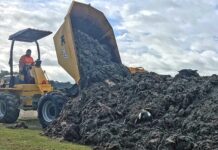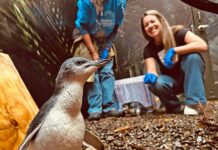A Rocky Bay community group with a pest-free vision for the island has made serious headway – but still hopes to recruit more volunteers to help target rats in the area.
Rocky Bay Ratbusters, a 150-strong group of Omiha residents, has been laying baited poison stations for the last three years around their homes. In recent months, they have detected a steep decline in the rat population, along with a noticeable increase in the number of native birds and plants.
“It’s about getting rid of rats, and that’s to foster the wildlife – the birds, the skinks and geckos, because rats really hammer them,” says John Laurent, who jointly co-ordinates the ‘street champions’ – local volunteers who set and place the bait stations.
“They used to be a much bigger problem; people say that 10 years ago they’d see rats running around their back yards. I remember once walking down the street here and seeing a rat scurrying up a tree in broad daylight. You don’t see that anymore.”
The group, formed by members of the Omiha Welfare and Recreation Society, received local board funding two months ago for more ‘Tomcat’ traps – specifically designed poison bait stations accessible only to mice and rats. Volunteers move and replace bait stations on a three-month cycle as the rodent population dwindles.
John, currently replacing and re-organising bait stations ahead of the next cycle, spends hours collating the amount of bait taken from each trap and adjusts the strategy accordingly.
The only thing better than an empty trap is a full trap, he says, which means there’s no more rats left in the area.
Recently, they’ve been able to lower bait levels along Glenbrook Road as they’ve successfully removed the rat population. But John still hopes to recruit more volunteers to fill gaps in places where rodents may still be left.
Their efforts represent an extension of those at nearby Whakanewha Regional Park, where traps have been installed to catch rats, stoats and other predators to protect endemic bird species.
Fellow organiser and long-time resident Dave Malan says the area is fortunate in having other volunteers looking after bait stations in near by reserves. “I think as long as we’ve got a good supply of street champions, and the people who have bait stations continue to lay the bait and report their results, we’ll be in a good position,” Dave says.
“The people who fund us need to know they’re getting tangible results for their investment.”
Rats, like possums and stoats, are an introduced species to New Zealand and have had a serious impact on native species, eating birds, seeds, snails, lizards, fruit, insects, eggs, chicks, larvae and flowers. A Department of Conservation goal is in place to establish a ‘predator-free’ New Zealand by 2050.
“We’re happy to have got funding from the local board for the next 12 months to do the project,” says Dave. “We’re really happy to provide the free labour, but the dollars for bait and the bait stations are vital, and we really appreciate the local board’s contribution.” • Richard Jones
For more on the predator-free goal, see this week’s Waiheke Weekender.







